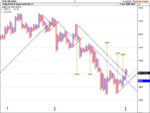How can I watch daytime TV when you keep raising interesting points!?
I suspect you'll cope without your fix
🙂
Makes sense, but I think the curve gradient turns negative at a certain point. I see people with 15 different colour lines hand-drawn on a chart, 12 indicators and a 5 page pre-market analysis. They don't see the wood for the trees.
If you read "Super Crunchers" then it is full of great examples of how simple automated analysis beats the experts almost every time!
Similar to programming (my day job); up to about 40-50 hours, most programmers can work productively. 50-70 hours and they're slowing down noticably. By about 80 hours, they would have beeen better off giving up and going home around 60 hours. This then drops further if done for multiple weeks at a time. Game developers are a bit of an exception because they only have to write stuff once and get it to work, maintenance is MUCH less of a thing. Many times I've spent longer untangling someone's work than they did writing it in the first place.
One of the lessons I learnt early on in trading, and I think is interesting, is that for every time I miss a good entry point because I'm getting tea/talking to a friend/asleep, I tend to miss a bad entry point that looks like a good entry point, too.
re. trends. Interesting. I've been using a Fourier transform approach but with limited success.
Problem with Fourier transforms is that they're meant for continuous data. So, lets say I do a transform on a year's sample data; that data is still contaminated by data over more than the current year. Someone with a better signals processing background than me might be able to filter out the longer term trends, but it's beyond my maths
🙁
re. S/R. I'm familiar with some approaches to this, seems like a pattern recognition problem though where carbon remains better than silicon.
I'm too geeky. My first thought was "Why would you base a computer on carbon?"...
Certainly, the problem I rapidly hit with automated trading was that I could see patterns that could be gone by the time I figured out how to express them in code. Neural nets would be a possible answer, but AI isn't my strong point. Currently looking at ways of abstracting the problem down into simpler parts that can be glued together much faster. Functional programming languages such as F# or Haskell are promising for helping with this.
FTSE looking choppy, now happy to take a second bite at the last low, still get R:R of >2.5
Yeah, I think it's exhausted, short of anything catastrophic happening in the last hour. Hoping to close this option position next week for a very nice profit, at this rate, though.

